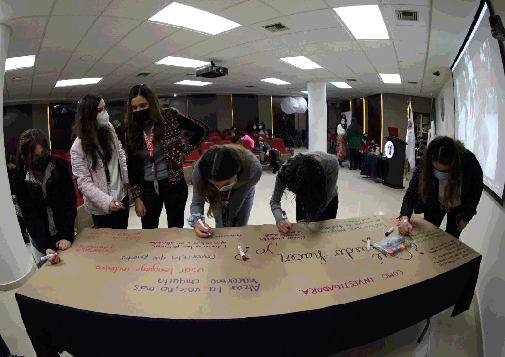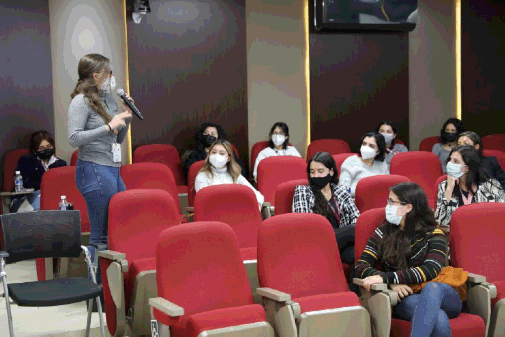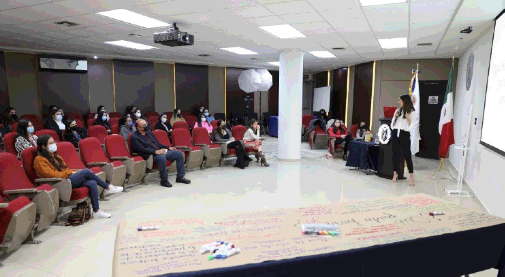Audience Participation Proposing Ways to Address Gender Bias at the University.

Daniela C. González-Cruz1, Sofía Jezzini-Martínez2, Paloma C. Leyva-Camacho1, Ilse Janeth De la Rosa-Rodríguez3, Andrea Flores-Rodríguez4, Karina Raygoza-Cortez4, Mariana García-Leal4
doi: http://dx.doi.org/10.5195/ijms.2023.1435
Volume 11, Number 1: 80-84
Received 10 03 2022; Rev-request 09 04 2022; Rev-request 18 08 2022; Rev-request 08 11 2022; Rev-recd 26 06 2022; Rev-recd 09 10 2022; Accepted 25 11 2022
ABSTRACT
Women have participated in science since the earliest of times. However, their valuable contributions are not as widely acknowledged throughout our history and women still face several barriers throughout their professional career. We developed and hosted a half-day Women in Science seminar organized by students, for students. The main goal was to promote ways to involve more women in research activities and to strengthen the scientific community within our medical school. The workshop consisted of three main sections, where we shared relevant statistics, resources, and strategies among a community of students interested in science. At the end of the workshop, participants shared their insights proving the necessity and utility of such events to strengthen the development of science as an inclusive field.
Keywords: Gender; Bias; Women; Science; Medicine; STEM (Source: MeSH-NLM).
Gender bias is an “unfair difference in the way men and women are treated.”1 This phenomenon has many different forms and extends to many work environments, including the scientific world.2–4 Gender bias affects women in hiring decisions, perceptions of the quality of their work, research publications, peer-review processes, citation patterns, and leadership positions, among others.5–9 Barriers such as gender wage gaps, sexual harassment, and maternity and paternity policies often prevent women from advancing in their professional careers, particularly in science.10–14 Studies have shown that gender bias begins early in education and has deleterious effects throughout many aspects of academia.15 It affects grading, mentoring, and letters of recommendation, which could certainly affect the progress of a woman in science.16, 17
Addressing this issue is key to pursuing gender equality in science, a problem that women have fought especially hard to overcome. Thus, we designed, developed, and hosted a half-day research-focused workshop to highlight the gender gaps in science and to provide information on research opportunities available for medical and clinical chemistry students. This workshop aimed to achieve the following goals:
The workshop was a hybrid event where students were invited to attend in person or online. Although the invitation was open to all students, each of the 50 participants identified themselves as women. The workshop was divided into the following three phases:
The first speaker was a fifth-year medical student from our university with previous research experience. Her session started with an implicit association exercise to assess unconscious bias in the audience. She continued with a talk titled “Women in Medical Sciences Throughout Time.” This talk presented women who have made essential contributions in the field of medical sciences. It included notable individuals such as Agnodice, an important figure of Ancient Greece18 and the first woman to be acknowledged as a gynecologist; Doctor Alice Hamilton, the first woman to become a faculty member of Harvard University;19 and Nobel Prize winners Doctors Emmanuelle Charpentier, Jennifer Doudna, and Rita Levi-Montalcini among other scientists and doctors.20 The purpose of this introduction was to show how women have been actively participating in medicine from ancient times to the present and how their contributions have played a great role in global and human development.
The second speaker was a first-year clinical chemistry student from our institution with previous research experience. The speaker focused on the National System of Researchers or SNI, a government-led program established in Mexico, in which scientific researchers across the country subscribe to receive funding for their projects and apply for academic positions. According to the data provided by SNI, only 37.2% of Ph.D. researchers are women.21 Thereafter, the speaker described some of the structural barriers that could explain the disparity between men and women in professional settings, such as the theory of the “glass ceiling and the sticky floor,” which addresses the challenges women face for being promoted in science, technology, engineering, and math (STEM) careers, as well as the increasing difficulty in securing a grant for research.22–25 At the end of this presentation, we conducted an activity in which the audience was encouraged to write down thoughts and ideas on how to improve women’s situation in science in the present and near future (Figure 1).
Figure 1.Audience Participation Proposing Ways to Address Gender Bias at the University.

The third speaker was a fourth-year medical student from our institution with previous research experience in the field of Psychiatry. The talk focused on empowering and instilling confidence in leaders, promoting empathetic and respectful communication, and suggesting ways to establish boundaries in the workplace. We continued with a pre-recorded interview with Sonia Hernández-Díaz, MD, PhD, a professor at Harvard T.H Chan School of Public Health. Her main area of research is Pharmacoepidemiology of Women’s Health. She spoke about the difficulties she faced in academia and shared insights on how she found her passion. We also displayed a video of women researchers around the world giving advice to inspire young students who are interested in research.
We ended the workshop with a question-and-answer panel in which the participants and the presenters could share their doubts and experiences. Participants shared ideas and opinions, and advice based on personal experiences and on how they found research opportunities within our university (Figure 2). Some of the attendees were already involved in research activities, therefore their input was of great importance to younger students who did not know where to begin.
Figure 2.Round Table.

This workshop accomplished its objective of motivating women to pursue and embrace science as a career. The participants were asked about their opinions and feelings regarding the workshop, they described it as an inspiring, deep, and informative experience. Here we propose specific actions so as to continue to address gender issues in science:
The Seminar.

Is it hard to be a researcher? Undoubtedly yes. Should we try despite the difficulties we are supposed to overcome? Definitely. This workshop allowed us to reflect on that. Although we have made a lot of progress over the past few years, we still have a long way to go to reduce and eventually close the gender gap in science. The impact of the event on the women of our institution proves the efficacy and the need for such interventions to enhance the development of women in science.
“This workshop was a genuine experience. It was a space created by women for other women, which made me reflect upon the value and importance of us women helping each other, highlighting our skills, and reminding us that instead of competing, we can be allies. Without a doubt, I could say that more than one of us went home wishing to become a woman in science.”
Claudia Ramírez Mata, first-year clinical chemistry student.
“Going to the workshop was enriching. I felt comfortable and safe, it was a very empowering environment. I loved that the speakers encouraged us to participate and even share our own experiences. It made me realize that there are many paths to follow in the world of science. They gave us advice to start doing research, and most importantly, they made us feel connected with other women as there is still work to do to achieve equality and lay a foundation for future events.”
Lourdes Gil Flores, fourth-year medical student.
“‘Women in science’ was a delightful event, full of emotions, knowledge, and women empowerment. At the beginning, it was quite frightening to listen to data about discrimination against women and gender inequality in professional life. But as the event went on, there were suggestions of what we can do to be part of the change, sharing of testimonies, and support from the whole auditorium. By the end of the event, I was sure that our generation can make a change, that there are people willing to help and redirect to the correct areas to seek change, and that with small actions we can start to eliminate the injustices that exist nowadays. Honestly, it was an event that I wish everyone, not just women, would attend.”
Daniela Ortega Mata, sixth-year medical student.
Las mujeres han participado en la ciencia desde el inicio de los tiempos. Sin embargo, sus logros no son tan vastamente reconocidos dentro de la historia. Actualmente, las mujeres enfrentan barreras asociadas al género cuando se trata de avanzar en su carrera profesional. Debido a esto, decidimos crear un espacio dirigido a estudiantes para hablar de la historia de la mujer en la ciencia y difundir estrategias para fortalecer la comunidad de mujeres en investigación. Durante este taller se compartieron estadísticas, experiencias personales y consejos sobre la trayectoria de distintas mujeres que se desarrollan en campos científicos alrededor del mundo. Al finalizar el taller, la retroalimentación de las participantes puso en evidencia la utilidad y necesidad de este tipo de espacios para motivar y enriquecer la comunidad científica de mujeres.
We thank Dr. Sonia Hernández-Diaz MD (Harvard School of Public Health) for her time and counseling sharing her experience on research and Medicine. We are grateful with the scientists Dr. Suetonia Palmer MD (University of Otago); Marleen Kunneman MD (Mayo Clinic); Nataly R. Espinoza-Suárez MD (Laval University); Angela M. Leung MD (University of California, Los Angeles); Dr. Marion Brunck (University of Queensland); Dr. Eva M. Trujillo-Chi Vacuán MD (Comenzar de Nuevo A.C.); Rosella Soriano-González MSc (Comenzar de Nuevo A.C.); Narjust Duma MD (Harvard Medical School); Andrea García MD (Mayo Clinic); Spyridoula Maraka MD (Arkansas University); Dr. Monica Siqueiros MD (Stanford University); and Helen O’Connell MD (University of Melbourne) for providing advice and words of encouragement. We wish to thank José Gerardo González-González MD, PhD for his support in creating and promoting this event. We also thank Miguel Zambrano-Lucio for proofreading our manuscript. Finally, we sincerely thank all our participants for joining this seminar and for their disposition to make a change in science.
The Authors have no funding, financial relationships or conflicts of interest to disclose.
Conceptualization, D.C.G.C., S.J.M., P.C.L.C., A.F.R., K.R.C., and M.G.L.; Methodology, D.C.G.C., S.J.M., P.C.L.C., A.F.R., K.R.C., and M.G.L.; Investigation, D.C.G.C., S.J.M., P.C.L.C., I.J.D.R., A.F.R., K.R.C., and M.G.L.; Writing – Original Draft, D.C.G.C., S.J.M., P.C.L.C., I.J.D.R., A.F.R., K.R.C., and M.G.L.; Writing – Review & Editing, D.C.G.C., S.J.M., P.C.L.C., and A.F.R.; Resources, A.F.R., K.R.C., and M.G.L.; Supervision, A.F.R., K.R.C., and M.G.L.
1. Moss-Racusin CA, Dovidio JF, Brescoll VL, Graham MJ, Handelsman J. Science faculty’s subtle gender biases favor male students. Proc Natl Acad Sci U S A. 2012;109(41):16474-9.
2. Masiero S, Aaltonen A. Gender Bias in Information Systems Research: A Literature Review. 2AISWN international Research Workshop on Women, IS and Grand Challenges 2020.
3. Beede D, Julian T, Langdon D, McKittrick G, Khan B, Doms M. Women in STEM: A gender gap to innovation. SSRN Electronic Journal. 2011.
4. United Nations Educational Scientific, and Cultural Organization. STEM and Gender Advancement (SAGA): improved measurement of gender equality in science, technology, engineering, and mathematics 2016. Available from: https://en.unesco.org/saga; updated 2018 Nov; cited 2022 Mar.
5. Roper RL. Does Gender Bias Still Affect Women in Science? Microbiol Mol Biol Rev. 2019;83(3).
6. Pinho-Gomes AC, Vassallo A, Thompson K, Womersley K, Norton R, Woodward M. Representation of Women Among Editors in Chief of Leading Medical Journals. JAMA Netw Open. 2021;4(9):e2123026.
7. Gërxhani K, Kulic N, Liechti F. «Double standards? Co-authorship and gender bias in early stage academic hiring. LIVES Working papers. 2020;86:1-32.
8. Lerchenmüller C, Lerchenmueller MJ, Sorenson O. Long-Term Analysis of Sex Differences in Prestigious Authorships in Cardiovascular Research Supported by the National Institutes of Health. Circulation. 2018;137(8):880-2.
9. Lerchenmüller C, Schmallenbach L, Jena AB, Lerchenmueller MJ. Longitudinal analyses of gender differences in first authorship publications related to COVID-19. BMJ Open. 2021;11(4):e045176.
10. Hoff T, Lee DR. The gender pay gap in medicine: A systematic review. Health Care Manage Rev. 2021;46(3):E37-E49.
11. Retrouvey H, Jakubowski J, Lipa JE, Forrest C, Snell L. State of Gender Diversity and Equity Policies within Plastic and Reconstructive Surgery in Canada. Plast Reconstr Surg Glob Open. 2020;8(9):e3047.
12. Mohan H, Ali O, Gokani V, McGoldrick C, Smitham P, Fitzgerald JEF, Harries R. Surgical trainees’ experience of pregnancy, maternity and paternity leave: a cross-sectional study. Postgrad Med J. 2019;95(1128):552-7.
13. Hu YY, Ellis RJ, Hewitt DB, Yang AD, Cheung EO, Moskowitz JT, Potts JR 3rd, Buyske J, Hoyt DB, Nasca TJ, Bilimoria KY. Discrimination, Abuse, Harassment, and Burnout in Surgical Residency Training. N Engl J Med. 2019;381(18):1741-52.
14. Johnson PA, Widnall SE, Benya FF, eds. Committee on the Impacts of Sexual Harassment in Academia, Committee on Women in Science, Engineering, and Medicine, Policy and Global Affairs. Sexual Harassment of Women: Climate, Culture, and Consequences in Academic Sciences, Engineering, and Medicine. Washington, DC: The National Academies Press; 2018.
15. Miller DI, Nolla KM, Eagly AH, Uttal DH. The Development of Children’s Gender-Science Stereotypes: A Meta-analysis of 5 Decades of U.S. Draw-A-Scientist Studies. Child Dev. 2018;89(6):1943-55.
16. Milkman KL, Akinola M, Chugh D. What happens before? A field experiment exploring how pay and representation differentially shape bias on the pathway into organizations. J Appl Psychol. 2015;100(6):1678-712.
17. Trix F, Psenka C. Exploring the color of glass: Letters of recommendation for female and male medical faculty. Discourse Soc. 2003;14(2):191-220.
18. Withers M. Agnodike: the first midwife/obstetrician. J Nurse Midwifery. 1979;24(3):4.
19. Winkelstein W Jr. Alice Hamilton: pioneer occupational epidemiologist. Epidemiology. 2006;17(5):591.
20. Mahmoudi M, Poorman JA, Silver JK. Representation of women among scientific Nobel Prize nominees. Lancet. 2019;394(10212):1905-6.
21. CONACYT. Listado de Investigadores Vigentes por Grado, Nivel, Adscripción, Entidad Federativa y Área de conocimiento 2018. Available from: https://datos.gob.mx/busca/dataset/sistema-nacional-de-investigadores; updated 2018; cited Mar 2022.
22. Segovia-Saiz C, Briones-Vozmediano E, Pastells-Peiró R, González-María E, Gea-Sánchez M. Techo de cristal y desigualdades de género en la carrera profesional de las mujeres académicas e investigadoras en ciencias biomédicas [Glass ceiling and gender inequalities in the careers of women academics in biomedical sciences]. Gac Sanit. 2020;34(4):403-10.
23. Ribeiras R. Women in cardiology: Between the “glass ceiling” and the “sticky floor”. Rev Port Cardiol (Engl Ed). 2021;40(7):505-8.
24. Burns KEA, Straus SE, Liu K, Rizvi L, Guyatt G. Gender differences in grant and personnel award funding rates at the Canadian Institutes of Health Research based on research content area: A retrospective analysis. PLoS Med. 2019;16(10):e1002935.
25. Julia Riccardi, Nicole I. Farber, Vanessa Ho, Stephanie L. Bonne, Uncovering Disparities in Scholarly Productivity among Junior Surgical Society Grant Recipients. J Surg Res. 2021;257:128-34.
26. United Nations Educational, Scientific, and Cultural Organization. Women in Science. Available from: http://uis.unesco.org/; updated 2019 June; cited 2022 Mar.
Daniela C. González-Cruz, 1 Sixth-year Medical Student. Facultad de Medicina, Universidad Autónoma de Nuevo León, Monterrey, Mexico.
Sofía Jezzini-Martínez, 2 Fifth-year Medical Student. Facultad de Medicina, Universidad Autónoma de Nuevo León, Monterrey, Mexico.
Paloma C. Leyva-Camacho, 1 Sixth-year Medical Student. Facultad de Medicina, Universidad Autónoma de Nuevo León, Monterrey, Mexico.
Ilse Janeth De la Rosa-Rodríguez, 3 Second-year Clinical Biochemistry Student. Facultad de Medicina, Universidad Autónoma de Nuevo León, Monterrey, Mexico.
Andrea Flores-Rodríguez, 4 MD. Facultad de Medicina, Universidad Autónoma de Nuevo León, Monterrey, Mexico.
Karina Raygoza-Cortez, 4 MD. Facultad de Medicina, Universidad Autónoma de Nuevo León, Monterrey, Mexico.
Mariana García-Leal, 4 MD. Facultad de Medicina, Universidad Autónoma de Nuevo León, Monterrey, Mexico.
About the Author: Daniela C. González-Cruz is a sixth-year medical student of a six-year program. She is a member of KER Unit México at the Universidad Autónoma de Nuevo León and currently participates in several research projects oriented towards Endocrinology and the quality of scientific research. Her main areas of interest are women’s health and the integration of gender perspective in Medicine.
Correspondence: Daniela C. González-Cruz. Address: Av. Dr. José Eleuterio González 235, Mitras Centro, 64460 Monterrey, N.L., Mexico. Email: dcgonzalezcruz@gmail.com
Editor: Francisco J. Bonilla-Escobar Student Editors: Johnmark Boachie & Joseph Tonge Proofreader: Laeeqa Manji Layout Editor: Ana Maria Morales Process: Peer-reviewed
Cite as González-Cruz DC, Jezzini-Martínez S, Leyva-Camacho PC, De la Rosa-Rodríguez IJ, Flores-Rodríguez A, Raygoza-Cortez K, García-Leal M. Women in Science: A Student Workshop at a University in Mexico. Int J Med Stud. 2023 Jan-Mar;11(1):80-84.
Copyright © 2023 Daniela C. González-Cruz, Sofia Jezzini-Martínez, Paloma C. Leyva-Camacho, Ilse Janeth De la Rosa-Rodríguez, Andrea Flores-Rodríguez, Karina Raygoza-Cortez, Mariana García-Leal
This work is licensed under a Creative Commons Attribution 4.0 International License.
International Journal of Medical Students, VOLUME 11, NUMBER 1, March 2023